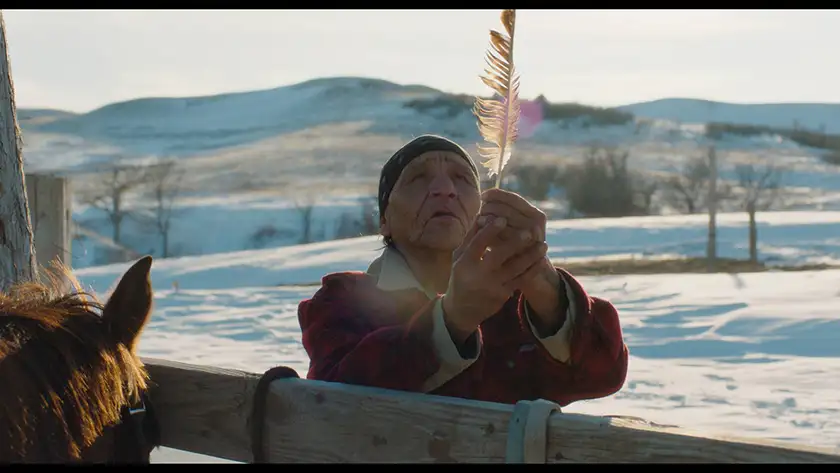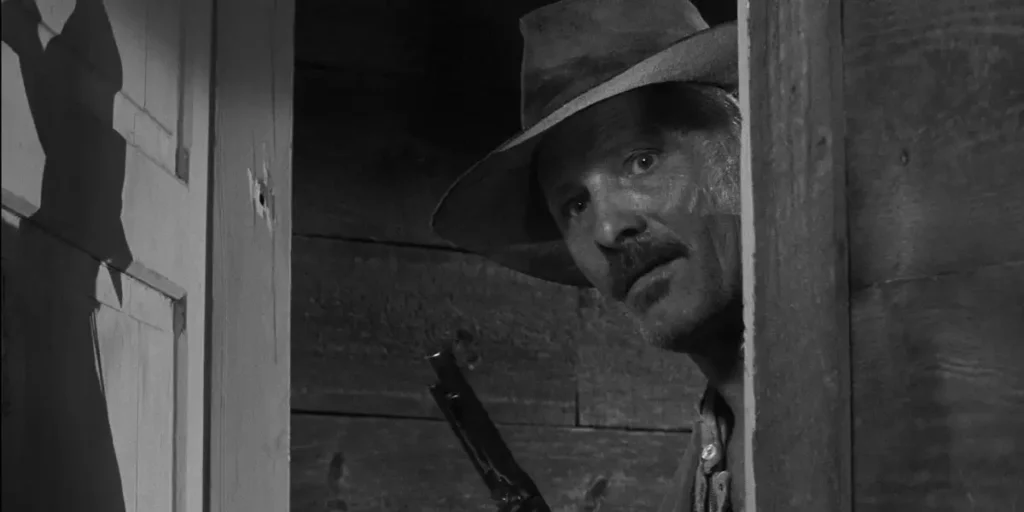In Eureka, Lisandro Alonso delivers another meditative and surprising examination of humanity and the nature of film itself.
A director like Lisandro Alonso is a rare thing. He invites viewers to take leaps of faith, because you can’t be sure where his films are going to go, or what they might say. His films can take leaps through time, but his fans will know to expect his usual fixation on characters driven by their own obsessions, desires and sometimes inexplicable needs. You’ll often find Lisandro’s characters just sitting and thinking for a while, and they invite the viewer to do the same. Eureka is no exception; it requires your patience, but will yield rewards.
The prologue to Eureka might entice the wavering viewer, as Viggo Mortensen’s grizzled cowboy arrives in a Western town looking for his wayward daughter. Despite that familiar setup, the tight 1.33:1 frame and crisp black-and-white cinematography offer a new twist. As the townsfolk engage in brawls and debauchery, you’d be forgiven for thinking we’re in a lost Aleksey German film. However, just as this story reaches a climax, Lisandro moves on to the next story, whether we’re ready or not. The transition from one story to the next is quite brilliant, but the differences between them could not be greater. From a stylised cowboy tale, we shift to rural South Dakota, where police officer Alaine (Alaina Clifford) goes on the beat, dealing with domestic disturbances, fights and drunkeness in the reservation she calls home. Alonso and his co-writers Fabián Casas and Martin Camano probably expects a chunk of the audience to check out at this point, but Alonso knows his fans will stay with it. They know he’ll surprise them yet.
The slow and steady pace of Eureka’s second act is Alonso all over. We spend time with Alaine, watching her interact with and, more importantly, react to the lost souls she encounters. Though the Dakota plains boast a barren windswept beauty, the faces of Alonso’s characters are always the most intriguing landscapes. Alaine is a professional, largely stoic on the job, and as warm as needs be to her well-meaning niece Sadie (Sadie Lapontie). It’s when the stresses of the job build that Alonso is in his element. Long takes of Alaine waiting for backup, or ignoring the belligerence of an arrested suspect, force the audience to interrogate the image, and see the flickers of emotion emerge from beneath Clifford’s restrained performance. Maintaining a stoic front in the face of stress is a universal experience, and Alonso confronts us with images at once relatable and beautiful. The red and blue lights of a police car dance across faces like aurorae.

Alonso’s formal playfulness is on full display in Eureka. When changing from one story to another, everything is altered, from setting to colour grading to aspect ratio. Alaine and Sadie’s story is shot in 1.85:1 with a documentarian’s eye. Following the opening’s stylishness, Alonso signals to us to pay more attention. These changes from act to act might lead to accusations of the director being arty for the sake of it, but his influences are clear to see, and certainly show no sign of pretension. The opening act is reminiscent of My Darling Clementine, while the combination of prairie landscapes and slow-burn emotions in the second act recall Kelly Reichardt. Yet even with the limited comfort of familiar reference points, Alonso dares the audience to follow along for the third act, which sees the film at its most narratively daring. As Sadie considers her place in the reservation, drastic measures are taken, and another unpredictable but mesmerising chapter of this anthology rolls in.
The transition from Dakota to the Amazon rainforest is impossible to describe; it’s just one of the sights here that could only appear in an Alonso film. The elements that can make up one of his films don’t make much sense on their own, but he’ll find a way to draw them together, and to draw in the audience in turn. In all three stories in Eureka, one can extrapolate themes of outside influence destroying a community, but all three are sufficiently nebulous and atmospheric to allow for any number of possibilities. As an Amazonian tribe starts infighting over dreams and misunderstandings, leading to a conclusion that invites confused head-scratching, the opening act with Cowboy Aragorn will seem a world away. But that apparent randomness is Alonso’s point. Eureka’s pleasures lie in its ambiguities. It is decidedly not for everyone, but Alonso’s devotees, and fans of ‘slow’ cinema, will revel in its patient, mature filmmaking. Drink it in.
Eureka was released in UK cinemas on February 16, 2024 and will open in select US theaters from September 20, 2024, with additional cities to follow.

